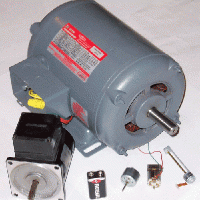Electric motors are the work horses of the electrical industry. Their use is so pervasive in our industrial society that approximately 75% of electrical power sold to industry is used for the operation of electric motors. With so many electric motors in operation, it becomes imperative that they be utilized and maintained properly. A failed electric motor causes delays in production, which in turn impacts the bottom line.
Electric motors come in a wide variety of shapes and sizes, and are designed as single-phase motors or three-phase motors. Single-phase motors, due to their design constraints, output from a fraction of a horsepower (HP) to about 5 HP. Three-phase motors can be designed for much larger loads, and some produce thousands of HP. There are also direct current (DC) motors that cover a fraction of a horsepower to several thousand horsepower. It is important to utilize the correct size motor for the application. If the motor is too small, it could fail in service due to stress. If the motor is too big, valuable energy is wasted because too much electricity is required to energize the motor.
When choosing a motor for an application, several factors, in addition to size, must be taken into account:
- Three phase electric motors have a design code that must be taken into account that relates percent (%) speed to percent (%) torque.
- The operating temperature of the motor needs to be taken into account and must correlate to the insulation class of the motor. If the motor becomes too hot while in operation, the electrical insulation on the motor windings will become too hot. This can cause failure of the motor.
- Motor enclosures must be adequate for the application. Various enclosures are available, from open, to totally enclosed, to explosion proof.
A well maintained motor is the best defense against motor failure. It is important to follow a maintenance schedule for routine maintenance, such as lubrication of bearings and brushes. It is also important to conduct periodic current checks to measure the operating temperature of the motor.
In addition, if a motor has been rebuilt, there may be problems with repair methods, especially in the case of explosion proof motors, which require certification by the repair shop before being put back into full operation.
As you can see, when electric motors fail, there are many factors that need to be considered concerning why it failed so repeated failures can be avoided.
Warren’s forensic engineering and consulting firm, founded in 1997, provides technical investigations and analysis of personal injury and property claims as well as expert testimony for insurance adjusters and attorneys. Extremely well versed in the disciplines of mechanical, electrical, chemical, structural, accident reconstruction and fire and explosion investigation, our engineers and consultants are known for delivering the truth — origin, cause, responsibility and cost of an event or claim — with unmistakable clarity.




